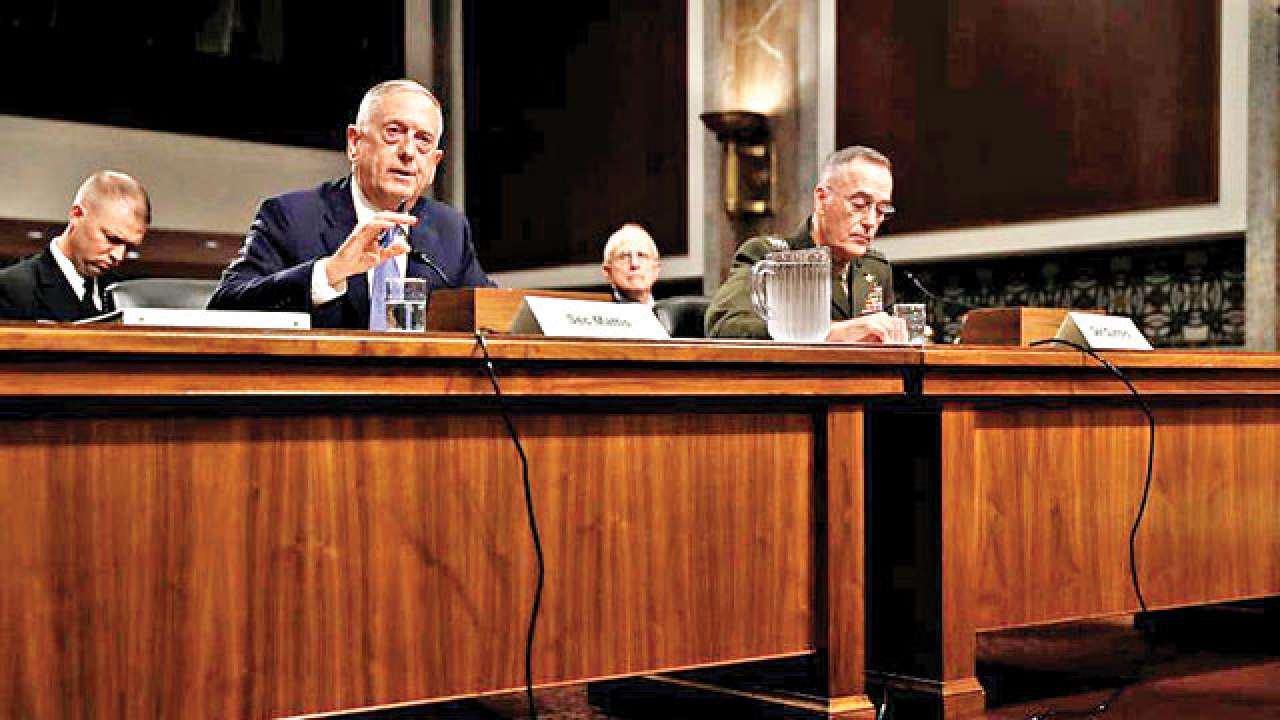
Seldom before has Pakistan been confronted by its oldest and closest ally, the US (being replaced by China), over its bad habit of cultivating terrorists on its land than the last week. US Defence Secretary Jim Mattis and Chairman Joint Chiefs of Staff, Gen Joseph Dunford, were testifying before the powerful Senate Armed Services Committee over President Trump’s new strategic policy for Afghanistan and South Asia. Mattis warned Pakistan to abjure use of terrorism to promote its political and military goals adding: ‘We need to try one more time to make this strategy work’, or else the implied threat, to take whatever steps to make it work.
About Pakistan’s ISI, Dunford said that it has its own foreign policy and connections with terrorist groups. No eureka here. Admiral Mike Mullen, who held Dunford’s job in 2011, had said: ‘The Haqqani group (a terrorist group linked to Afghan Taliban) is a veritable arm of the ISI’. Both Mattis and Dunford, key players in Trump’s new Afghanistan security strategy, are trying to alter Pakistan’s behaviour with Dunford advocating a multilateral approach rather than the bilateral one the US has tried. Kid gloves do not work with Rawalpindi. Rather, the gloves have to come off.
India should neither get excited nor euphoric about the Mattis-Dunford speak. The US-Pakistan relationship is a riddle wrapped in a mystery shrouded by an enigma. Still, straight-talking Trump has excelled his policy executives in nailing Pakistan’s bad behaviour — accusing it of harbouring agents of chaos, providing safe havens to terrorist organisations like Taliban and other groups that pose a threat to the region and beyond. The new administration has taken some action: Withheld/curtailed Coalition Support funds, threatened to revoke Most Favoured Non-Nato Ally status, shut operations of Karachi-based Habib Bank in the US, and slapped a fine of $225 million for illicit transactions.
Pakistan is an expert in running with the hare and hunting with hounds. Its initial reaction to Trump was typical: Denial, followed by statements like ‘US is scapegoating Pakistan for its own failures in Afghanistan’’. But contradictions between the civilian and military leadership were soon visible. While on Pakistan Defence Day Army Chief Gen Qamar Bajwa visited Kabul, sought a political resolution of Kashmir and pledged not to allow use of Pakistan soil against any country, former Defence minister and current Foreign Minister Khawaja Asif, on a make and mend visit to the US, admitted for the first time that internationally proscribed terrorist organisations like Lashkar-e-Taiba and Jaish-e-Muhammad were operating from within the country. Asif told a think tank in New York “yes, they are a liability (strategic assets for ISI) but give us more time to get rid of them as we do not have assets to deal with them. Don’t forget they were your darlings 20 to 30 years ago”. No Pakistani official has spoken so openly before. Will Bajwa get rid of Asif?
It is early days of Trump times. Mattis has said US will watch Pakistan’s choices on Trump’s new strategy on Afghanistan and South Asia. He has said Pakistan should realise that the tide has shifted and it must stop providing sanctuaries to terrorists on its soil. Mattis was asked why Pakistan would change its behaviour on safe havens this time, when it has repudiated all previous US efforts. That’s the pivotal question. Any change of behaviour may follow if and when US will cross certain red lines on imposing military and diplomatic costs on Pakistan.
India has come out of this episode looking pretty. Trump praised India for being a key security and economic partner, cementing the US-India Strategic Partnership which is central to US policy on Afghanistan and South Asia.
Still, he wanted India to do more than the $3 bn in grant and aid it has invested in Afghanistan. The Trump strategy is a remarkable turnabout in US’s India policy on Afghanistan where previously Islamabad’s prism-view prevailed. Pakistan would not engage India on Afghanistan saying it had no legitimate role there. The new trilateral Kabul-New Delhi-Washington mechanism on Afghanistan will be challenged by the evolving Beijing-Moscow-Islamabad-Tehran axis.
The immediate question is, will Pakistan, a country which provided safe haven to Osama bin Laden, Mullah Omar and other terrorist leaders, relent. Asif’s admission in the US is just a straw in the wind. Still, the US has several options to persuade Pakistan to gradually downgrade its perceived terrorist strategic assets as liabilities — withdrawing MFNNA status, sanctioning ISI and terrorist group leadership, withholding funding and declaring Pakistan a terrorist-sponsoring state. But the game-changer would be extended drone strikes to target Taliban and Haqqani leadership and their sanctuaries. This would be an extreme step — one that may work, but the US may be loath to take.
Till date, the US has conducted 424 drone strikes in Pakistan, all except three in FATA killing 2489 - 3919 terrorists. The three strikes beyond FATA were outside the agreed area of engagement as Pakistan is not a declared war zone and were authorised by Presidents Obama and Trump. Trump famously said he has ‘left the war to the Generals’. They are Mattis, McMaster and Dunford. A retired US General recently told me: ‘ although we call Pakistan a frenemy…we don’t want to start another war…as we still need Pakistan for Afghanistan’, adding, ‘remember they helped us get the Russians out of Afghanistan and they have nuclear weapons’. How far will the Generals go?
The author is founder member of Defence Planning Staff, currently the Integrated Defence Staff